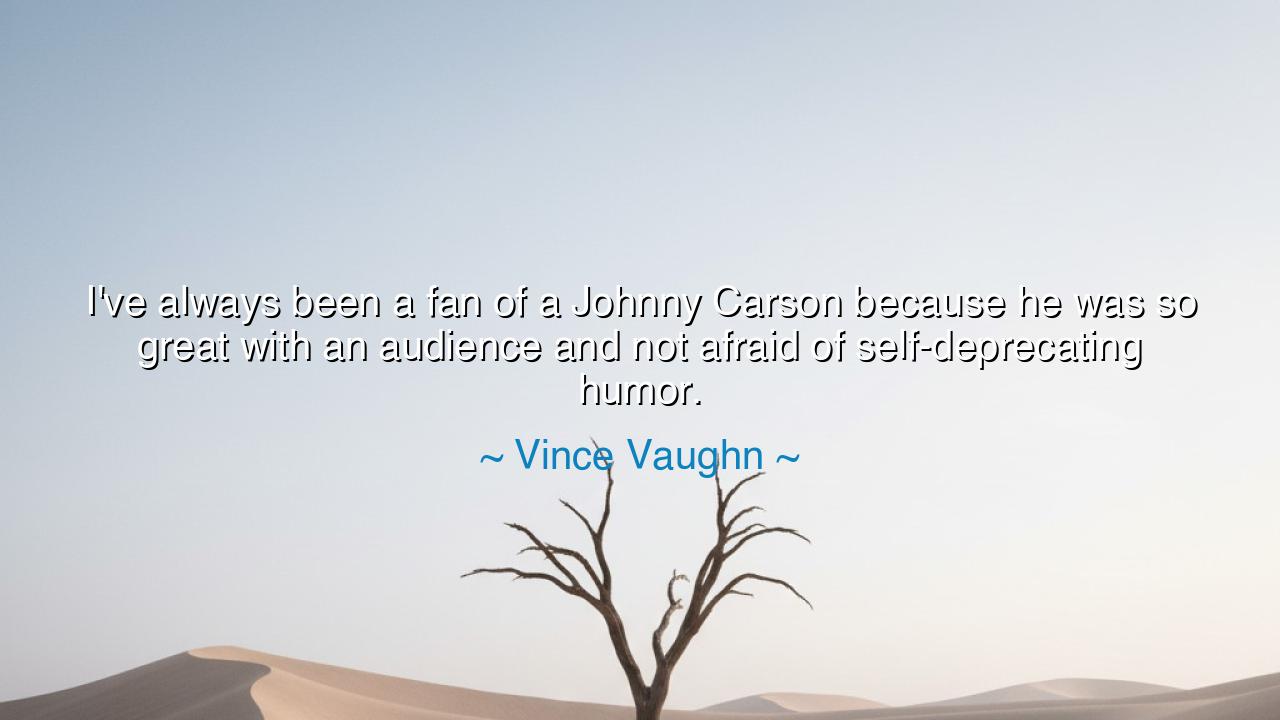
I've always been a fan of a Johnny Carson because he was so great
I've always been a fan of a Johnny Carson because he was so great with an audience and not afraid of self-deprecating humor.






The words of Vince Vaughn carry with them both reverence and recognition of a deeper truth: “I’ve always been a fan of Johnny Carson because he was so great with an audience and not afraid of self-deprecating humor.” Beneath this simple tribute lies a timeless lesson in humility, authenticity, and mastery of connection. Vaughn, himself a craftsman of laughter and storytelling, honors not only a man but a philosophy — that the truest bond between a performer and his audience is built not on pride, but on vulnerability, not on superiority, but on shared humanity.
Johnny Carson, the legendary host of The Tonight Show, was more than a television icon; he was a mirror of the American spirit in an age of rapid change. Night after night, he stood before millions, wielding wit as his instrument and grace as his armor. Yet what made him truly great with an audience was not his jokes alone, but his humility. He laughed at himself. He stumbled on air and turned it into comedy. In a world that worships perfection, he dared to be imperfect — and thus, beloved. The essence of self-deprecating humor lies in this very paradox: that to lower oneself in jest is to rise in the hearts of others.
The ancients would have called this the art of balance — the harmony between confidence and humility. For every wise ruler, philosopher, or poet knew that arrogance blinds, while self-awareness frees. Vince Vaughn, in admiring Carson’s humility, recognizes that the power of humor does not come from standing above others, but from standing beside them. The laughter of the proud divides; the laughter of the humble unites. When Carson made himself the punchline, the people saw not a star, but a man — one who faltered, blushed, and laughed just as they did. In that shared humanity, the walls of performance fell away, and something sacred emerged: trust.
This kind of humor has ancient roots. In the courts of kings, the fool was often the only one who could tell the truth. He jested at the monarch’s pride by first jesting at his own. Through laughter, he revealed wisdom without inciting wrath. Likewise, the philosopher Diogenes of Sinope used ridicule not to mock others, but to humble himself and expose the vanity of society. When asked why he begged from statues, he replied, “To get used to being refused.” In such humor lies strength — the courage to embrace imperfection, to turn one’s flaws into lessons rather than shame. Carson, too, embodied this ancient spirit: he laughed at his own missteps and, in doing so, made his audience feel safe to laugh at theirs.
In our age, where pride often masquerades as confidence and vanity hides behind applause, self-deprecating humor stands as an act of quiet rebellion. It reminds us that true greatness is not the absence of fault, but the grace to own it. The one who can laugh at himself is untouchable, for he has nothing left to hide. This, perhaps, is what Vaughn admired most: Carson’s refusal to wear a mask before his audience. His humor was not a weapon but a bridge — a way to reach into the hearts of people who longed to be seen, not dazzled.
The lesson, then, is clear and enduring: cultivate humility in your humor, and you will never lose your audience — whether that audience is the world, your friends, or your own conscience. Do not fear laughter at your expense; fear only the pride that makes you untouchable. When you can laugh at yourself, you show others that imperfection is not weakness but proof of life. The world needs not more jesters of mockery, but teachers of kindness — those who, like Carson, can turn folly into fellowship.
And so, dear listener, take this wisdom into your own life: when you falter, laugh; when you succeed, smile without arrogance; when you face others, bring warmth, not superiority. For humor, when born of humility, becomes a form of love — a reminder that we are all stumbling toward light, together. As Vince Vaughn honors Johnny Carson, so we too should honor those who teach us to face the world with both courage and grace — to speak with brilliance, yes, but also to laugh with gentleness.
For in the end, it is not the joke that endures, but the spirit behind it. The one who dares to laugh at himself teaches the world to breathe again. Self-deprecating humor is not weakness — it is wisdom wearing a smile. And in that smile, the soul of humanity finds its reflection.






AAdministratorAdministrator
Welcome, honored guests. Please leave a comment, we will respond soon